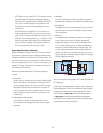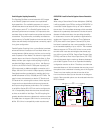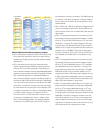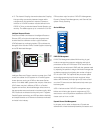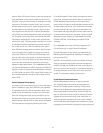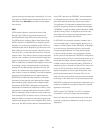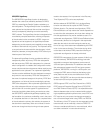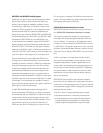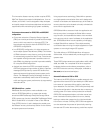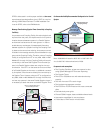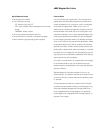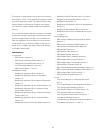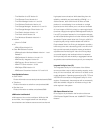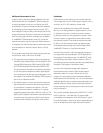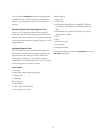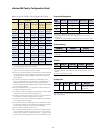51
This innovative disaster recovery solution requires GDPS,
IBM Tivoli System Automation for Multiplatforms, Linux on
zSeries, and z/VM 5.1 and is designed to help anticipate
and rapidly respond to business objectives and technical
requirements while maintaining high system availability.
Performance enhancements for GDPS/PPRC and GDPS/XRC
confi gurations
• Concurrent activation of Capacity Backup Upgrade
(CBU) can now be performed in parallel across multiple
servers, which may result in an improved RTO. This
improvement may apply to both the GDPS/PPRC and
GDPS/XRC confi gurations.
• In a GDPS/XRC confi guration, it is often necessary to
have multiple System Data Movers (SDMs). The number
of SDMs is based on many factors, such as the number
of volumes being copied and the I/O rate. Functions are
now capable of being executed in parallel across mul-
tiple SDMs, thus helping to provide improved scalability
for a coupled SDM confi guration.
• Analysis has shown that PPRC commands issued by
GDPS will generate a large number of Write to Operator
messages (WTOs) that may cause WTO buffer short-
ages and temporarily adversely impact system perfor-
mance. The Message Flooding Automation function is
expected to substantially reduce the WTO message
traffi c and improve system performance by suppressing
redundant WTOs.
GDPS/Global Mirror – preview
IBM Global Services plans to make available a new
service, GDPS/Global Mirror, to support the recently
announced IBM TotalStorage Enterprise Storage Server
(ESS) remote copy function called IBM TotalStorage Global
Mirror. Global Mirror is included in Peer to Peer Remote
Copy (PPRC) Version 2, and is designed to enable a two-
site disaster recovery and backup solution for the zSeries
and open systems environments.
Using asynchronous technology, Global Mirror operates
over high-speed communication links and is designed to
maintain a consistent and restartable copy of the data at a
recovery site that can be located at virtually unlimited dis-
tance from the application site.
GDPS/Global Mirror executes in both the application and
the recovery sites. It manages the Global Mirror remote
copy function, and automates the restart of the workload
in the recovery site in case of a disaster in the application
site. GDPS/Global Mirror has the capability of managing
multiple Global Mirror sessions. The multiple sessions
could be the data mirroring of multiple sysplexes or Open
systems or even single image z/OS systems.
The initial delivery of GDPS/Global Mirror will support
zSeries data. A future release will provide support for open
systems data.
These GDPS enhancements are applicable to z800, z900,
z890, and z990. For a complete list of other supported
hardware platforms and software prerequisites, refer to
the GDPS executive summary white paper, available at:
ibm.com/server/eserver/zseries/pso.
Automatic Enablement of CBU for GDPS
The intent of the GDPS (CBU) is to enable automatic man-
agement of the reserved PUs provided by the CBU feature
in the event of a processor failure and/or a site failure.
Upon detection of a site failure, GDPS will dynamically add
PUs to the confi guration in the takeover site to restore pro-
cessing power for mission-critical production workloads.
GDPS-CBU management helps to minimize manual cus-
tomer intervention and the potential for errors, thereby
helping to reduce the outage time for critical workloads
from hours to minutes. Similarly, GDPS-CBU management
can also automate the process of dynamically returning
the reserved CPs when the temporary period has expired.



